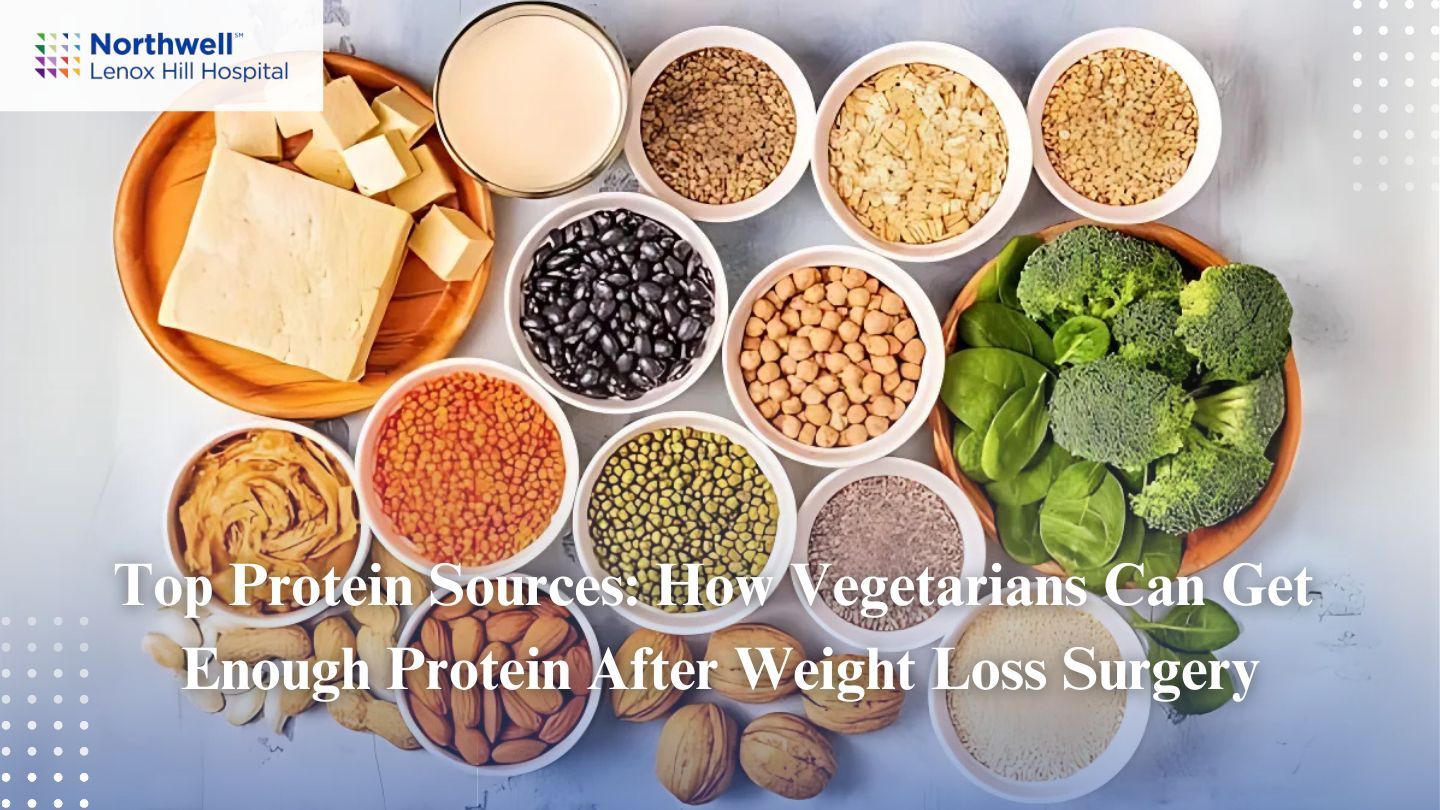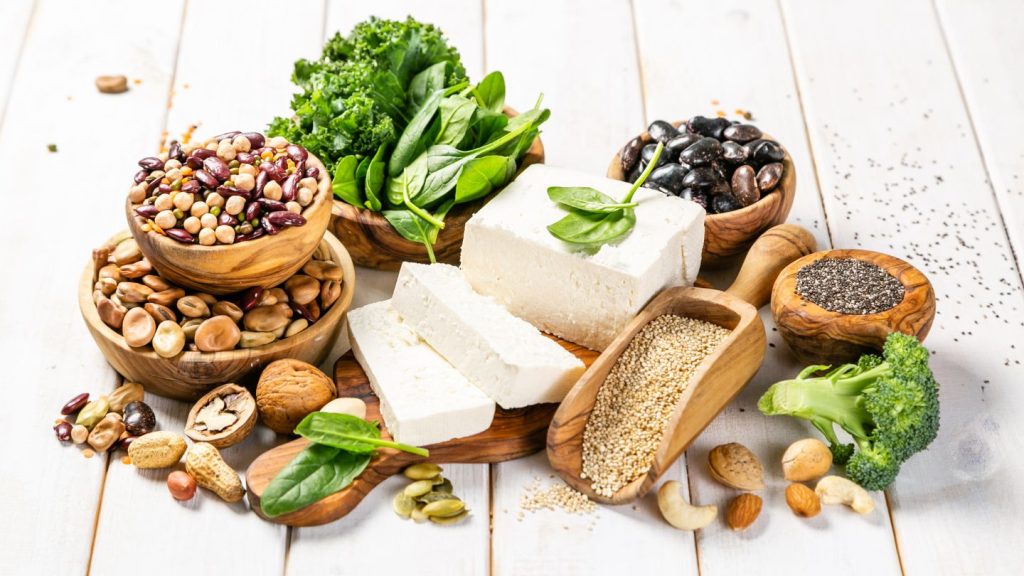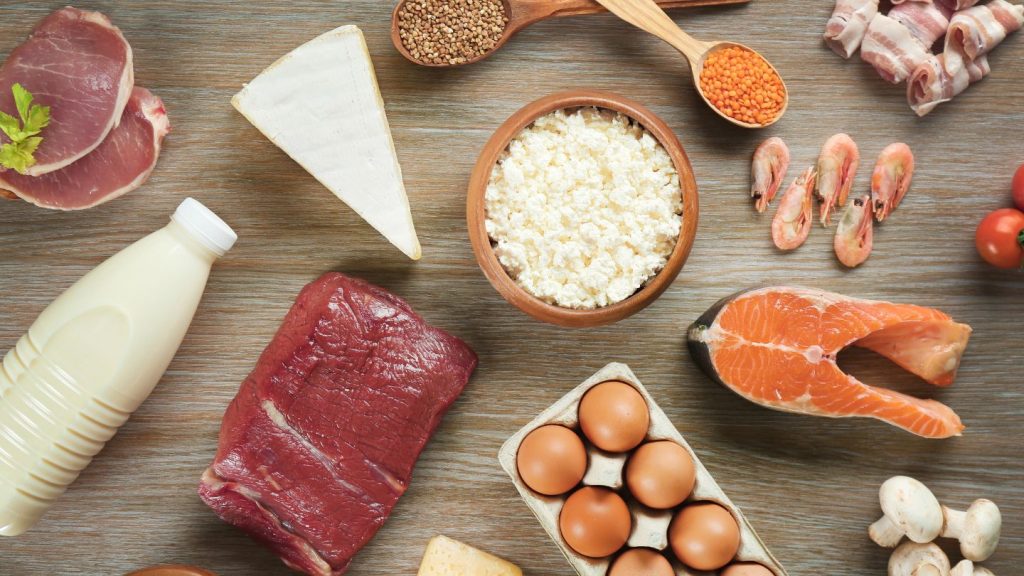
Top Protein Sources: How Vegetarians Can Get Enough Protein After Weight Loss Surgery
How can vegetarians get enough protein after weight loss surgery? After bariatric surgery, vegetarians need to carefully plan their diets. This blog offers practical advice and lists plant-based protein sources to help you meet your nutritional needs.
Key Takeaways
- Post-weight loss surgery, it is essential for individuals to meet protein needs of 60 to 100 grams daily to support recovery and prevent muscle loss.
- Vegetarians can fulfill protein requirements through diverse plant-based sources, including legumes, nuts, seeds, soy products, and dairy or eggs if included in their diet.
- Combining incomplete proteins and considering protein supplements can help vegetarians achieve a balanced intake of all essential amino acids post-surgery.
Importance of Protein After Weight Loss Surgery
Protein is crucial for recovery after weight loss surgery, supporting healing and preserving muscle mass during rapid weight loss. Adequate intake helps repair tissues and maintain overall strength and functionality during your weight loss journey.
Inadequate protein intake can result in muscle breakdown, delayed recovery, and other health issues. For bariatric patients, maintaining a high protein intake is essential to avoid complications and support optimal post-surgery outcomes.
Post-surgery, individuals typically need 60 to 100 grams of protein daily, depending on factors like gender, activity level, and overall health. These proteins must include nine essential amino acids, which come exclusively from the diet. For vegetarians, achieving this through plant-based options requires careful dietary planning and professional guidance.
Understanding Protein Needs Post-Surgery

Following bariatric surgery, patients must consume between 80 and 100 grams of protein daily to preserve muscle mass and bolster overall health. Protein intake helps maintain muscle tissue, which supports recovery and enhances physical function.
Achieving this level of protein intake can be challenging for vegetarians, whose sources are exclusively plant-based. Initially, post-surgery patients follow a liquid diet, making it difficult to meet protein goals. Transitioning to solid foods requires the strategic incorporation of high-protein options to avoid nutrient deficiencies.
Professional services, such as consultations with registered dietitians, play a vital role in helping patients meet their protein needs safely and effectively. These experts design tailored meal plans using plant-based proteins like dairy products (if included), legumes, nuts, seeds, and whole grains, ensuring a balanced intake while avoiding common pitfalls like excess fat consumption.
Plant-Based Protein Sources

Individuals following a vegetarian lifestyle can meet their protein needs by incorporating a variety of plant-based sources into their diet. Professional guidance ensures that the selection of these sources not only fulfills nutritional requirements but also optimizes recovery and overall health. Dietitians can help design personalized meal plans that leverage the benefits of these protein options while addressing post-surgery dietary restrictions.
Plant-based proteins offer vital nutrients and contribute to numerous health benefits. These dietary options are particularly advantageous for vegetarians recovering from surgery, as they help maintain a well-rounded and nutritionally complete diet. With the help of expert meal planning, patients can seamlessly integrate plant-derived proteins into their meals to support healing and recovery.
Legumes and Pulses
Legumes, such as beans, lentils, and chickpeas, are exceptional plant-based protein sources and are especially beneficial after surgery. Beyond protein, these foods provide essential nutrients like fiber, vitamins, and minerals, which aid in digestion and overall health.
Dietitians play a crucial role in guiding patients to incorporate legumes into their diets effectively. For example, they can recommend portion sizes, cooking methods, and combinations with other foods to maximize protein absorption and minimize digestive discomfort. By including legumes in soups, salads, and main dishes, patients can robustly meet their protein needs under professional supervision.
Nuts and Seeds
Nuts and seeds, including hemp seeds, chia seeds, and almonds, are nutrient-rich sources of plant-based protein. For example, three tablespoons of hemp seeds provide approximately 9 grams of protein. However, these foods are calorie-dense due to their fat content, making portion control essential.
With professional assistance, patients can incorporate nuts and seeds into their diets in ways that balance protein intake with other dietary needs. Dietitians may recommend sprinkling seeds on salads, blending them into smoothies, or adding them to baked dishes, ensuring optimal nutritional benefits while avoiding overconsumption.
Soy Products
Soy-based foods, such as tofu, tempeh, and edamame, are indispensable components of a vegetarian diet after weight loss surgery. These options are complete proteins, providing all essential amino acids necessary for recovery. Tofu, in particular, is a low-fat, high-protein option ideal for post-surgery dietary requirements.
Dietitians provide valuable advice on how to incorporate soy products into meals in practical and delicious ways. For instance, tofu can be used in stir-fries or soups, while soy milk can enhance protein intake in beverages or recipes. By tailoring soy-based meal options to individual needs, healthcare professionals ensure patients derive the maximum benefit from these versatile protein sources.
Dairy and Egg Protein Options

Vegetarians who include dairy and eggs in their diet can obtain high-quality protein from these sources. Greek yogurt, especially beneficial for those who have undergone bariatric surgery, offers a substantial amount of protein along with digestion-supporting probiotics. It serves as an ideal snack or a supplementary source of protein when incorporated into larger meals. Some individuals may prefer maintaining a diet that incorporates dairy products.
Another top-notch option is cottage cheese. Its creamy consistency, coupled with significant protein levels, makes it highly favorable. Eggs are also advantageous due to their diverse cooking possibilities and the ease with which they can be made ready to eat, providing another avenue to boost one’s protein consumption. They can be seamlessly integrated into dishes alongside other proteins, such as Greek yogurt, to create well-rounded, nutritionally balanced meals.
Combining Incomplete Proteins
Plant-based proteins often lack one or more essential amino acids. Dietitians emphasize the importance of combining incomplete proteins to create complete amino acid profiles.
For example, pairing legumes with whole grains, like rice and beans, or nuts with seeds can help vegetarians achieve a balanced intake. Dietitians can guide patients in selecting complementary food combinations that are easy to prepare and align with post-surgery dietary guidelines.
Protein Supplements
After bariatric surgery, dietary restrictions may make it difficult to achieve protein targets. Registered dietitians may recommend plant-based protein supplements specifically designed for post-operative patients. These supplements provide a convenient way to meet protein needs without compromising dietary restrictions.
Dietitians also address other nutrient deficiencies common after surgery, such as vitamin B12 or iron, ensuring a comprehensive recovery plan tailored to individual requirements.
Tips for Increasing Protein Intake
Professional guidance is key to incorporating high-protein foods post-surgery. Dietitians can suggest practical strategies, such as starting each meal with a protein source and spreading protein intake evenly throughout the day.
In addition to meal planning, they may recommend protein-rich snacks like Greek yogurt or pre-portioned nuts. Registered dietitians work closely with patients to ensure these strategies align with their recovery goals and nutritional needs.
Common Concerns and Solutions
After surgery, managing protein consumption can be challenging due to reduced stomach capacity and dietary restrictions. Professional supervision helps address common issues, such as balancing protein intake with fiber consumption to prevent gastrointestinal distress.
Dietitians provide tailored solutions, such as adjusting portion sizes or modifying recipes to accommodate post-surgery digestion. They also monitor patients for signs of excessive protein intake, which can lead to complications like kidney strain, and adjust dietary plans accordingly.
Summary
Meeting protein requirements is vital for vegetarians who have undergone bariatric surgery to ensure effective recovery and support overall health. By integrating a variety of plant-based proteins, consulting with professionals, and considering supplements when necessary, individuals can maintain a balanced and nutritionally complete diet.
At Lenox Hill Bariatric Surgery Program, we specialize in providing comprehensive support for those considering bariatric surgery in NYC. Our expert team is committed to offering personalized dietary planning and care to help you achieve a nutrient-rich diet post-surgery, setting the stage for a healthier, more energetic lifestyle. Contact us today to start your journey towards wellness.
Frequently Asked Questions
What should vegetarians prioritize when transitioning from liquids to solid foods after bariatric surgery?
Vegetarians should focus on easily digestible, protein-rich foods like tofu, Greek yogurt (if included), and soft legumes. Gradually incorporate a variety of plant-based proteins while consulting a dietitian to avoid nutrient deficiencies.
Can plant-based protein sources provide enough amino acids for recovery after weight loss surgery?
Yes, by combining incomplete proteins like legumes and grains (e.g., rice and beans) or nuts and seeds with whole grains, vegetarians can achieve a complete amino acid profile.
Are there any post-surgery challenges specific to vegetarians, and how can they be managed?
A common challenge is meeting protein needs without overloading on fiber or fats. Professional dietary planning ensures balanced meals that provide sufficient protein while addressing post-surgery digestive sensitivities.